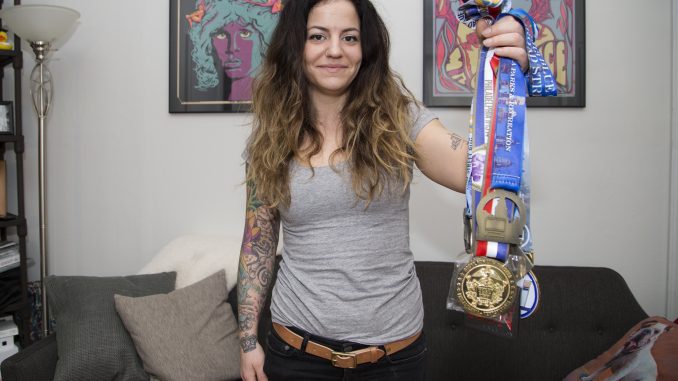
Before her graduation on Thursday, Chelsey Cain went to buy a bag of dog food for her 4-year-old bulldog Smeagol.
After carrying the bag to her car, she sat in her driver’s seat and started to cry as she tallied the number of tickets she had for graduation friends and family.
She had six people coming to support her, a number that left her awestruck.
Hours later, she nervously stood on a step leading to the main stage of the Temple Performing Arts Center, ready to accept her diploma.
She climbed the stairs and received her psychology degree to the cheers from her supporters, and threw up a peace sign.
For that day, her criminal record didn’t matter. It didn’t weigh her down.
Cain, 31, was arrested in 2009 on four felony charges after she was caught stealing guns and selling them in exchange for drugs.
Her drug abuse started in high school. It quickly escalated to prescription drugs, like Percocet and Vicodin, before switching to OxyContin, heroin and cocaine. Her addiction, she said, cost her nearly $1,000 a day. Her hair started falling out, she stole to maintain her habit and oftentimes she chose another fix over having enough gas to drive herself home.
“Once you’re in the throes of addiction, that’s your life,” she said over the phone. “You literally live for that. … You don’t care where you get high, you could get high in a McDonald’s bathroom or right in the car. If you’re sick, you’re definitely shooting up in the car. You don’t care if people are going to see you.”
Then, Sept. 3, 2009, she was arrested by a detective and faced four felony charges, 11 misdemeanor charges and up to 15 years in jail.
The same detective who arrested Cain pleaded her case and helped get her sentence reduced to 18-36 months in state prison.
Cain went through her detoxification period in a “daze” that, to this day, she can’t remember. All she remembers is that she was afraid her cellmate would harm her and that she lost more hair.
Her mother, Judith, had never seen her daughter in such a state. Her body was frail, her skin was green and she was “shackled,” she said.
Cain believes the experience—while hellish—saved her life.
“I was on death’s door—no doubt about it,” the Delaware County native said. “I was surrounded by dangerous people. If I hadn’t gotten arrested, I probably would have died in the near future. … I needed to get in big trouble, not just a 30-day spin. I needed a big crime that would force me to get myself together.”
Judith said the judge who convicted her daughter echoed this sentiment.
“Her father asked the judge, ‘Did we do the right thing?’” Judith said. “And the judge said, ‘Yes, you did. She would have been dead in a couple of weeks.’”
Cain spent the majority of her prison time in a minimum-security correctional facility in Erie, Pennsylvania. She estimates between 30 and 35 women shared a cell with her while she served out her sentence with up to three roommates at a time. She began working out in her cell, using only four floor tiles to avoid disturbing her cellmates.
“I was like that Terminator chick,” Cain said. “It helped me focus on myself. Those environments lack self-esteem and lack motivation.”
Now, Cain has completed multiple distance races, including a triathlon and several marathons.
Cain earned high clearance and could eventually order items with money her parents sent her, due to her good behavior.
One day, an inmate asked Cain to order items for her, and when Cain refused, the woman attacked her in an area where surveillance cameras wouldn’t record them.
These fights became a common occurrence for Cain, but she didn’t fight back. She knew defending herself would only lead to an extended sentence.
“I wasn’t going to call my family and tell them, ‘I engaged in stupid, childish activity, and I’m not coming home as soon as you think I am,” she said.
In June 2011, Cain was sent home.
With felonies on her record, she struggled for months to find work, but she found a full-time job in January 2012 and re-enrolled at Delaware County Community College.
“I felt like I had a lot to prove to society,” Cain said. “People looked at me like a junkie, or a felon. I was determined to prove people wrong.”
During her time in community college, she moved into her own apartment with her boyfriend, Matt Montones, adopted Smeagol as a sickly 4-week-old puppy bred for fighting and progressively increased her course load.
Montones said despite the added pressures of living without her mother, Cain stayed disciplined.
“She was on school full-time, worked 40 hours a week and trained for a marathon,” he said. “She’s just always done more. She never cheats herself out of anything.”
In 2013, Cain finished her spring semester and began applying to universities. She took the fall semester off, applied to Temple and received her acceptance letter during her time off.
“It meant so much for me, being accepted,” she said. “I didn’t think any university would ever accept me.”
Now graduated, Cain is planning a trip to China, the next trip of many she’s taken since completing her parole in 2014. She is exploring options for graduate school, looking to eventually be in a position to help reconstruct programs for inmates struggling with drug addiction or violence-prevention.
“I was able to empathize and communicate with almost all of my cellmates,” she said. “I have first-hand knowledge on what does and doesn’t work. … At one point, I said, ‘Hey, maybe I could do this on the outside.’”
EJ Smith can be reached at esmith@temple.edu.


Be the first to comment